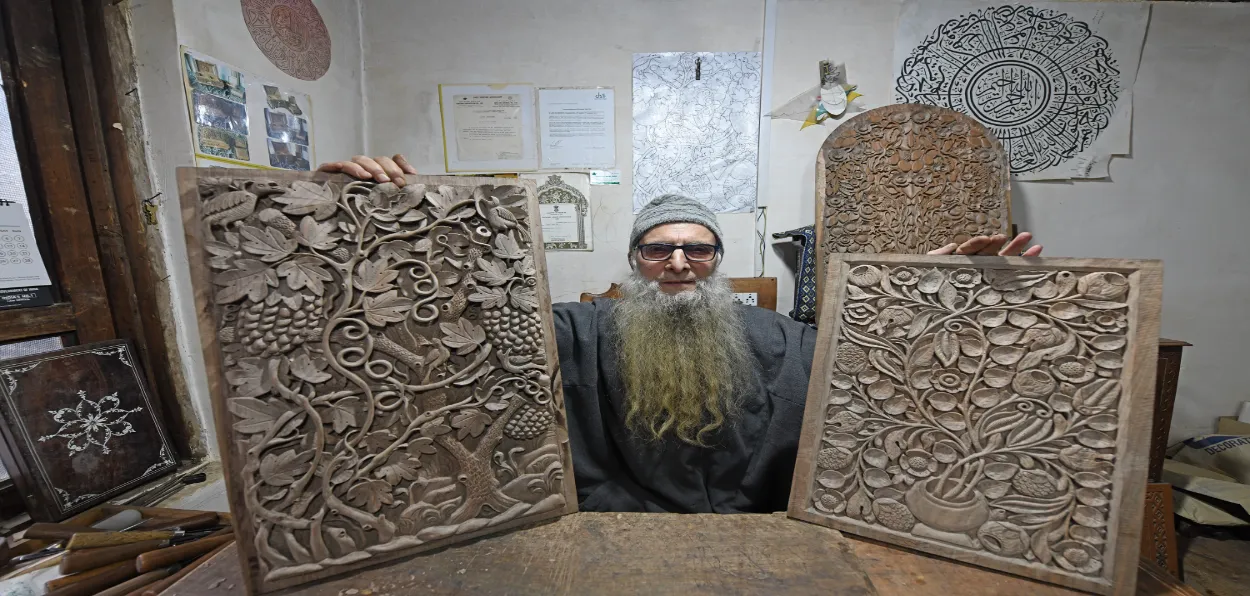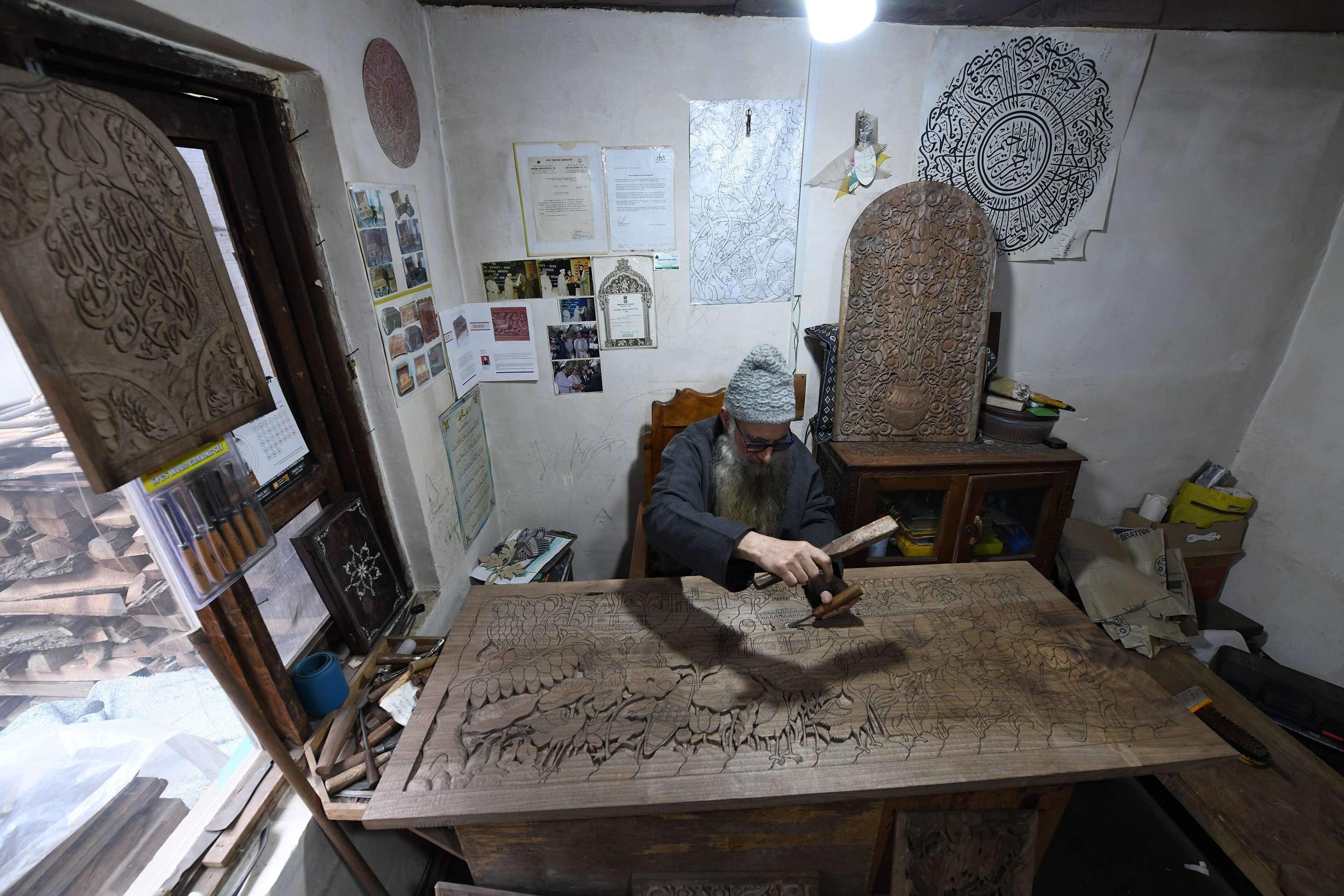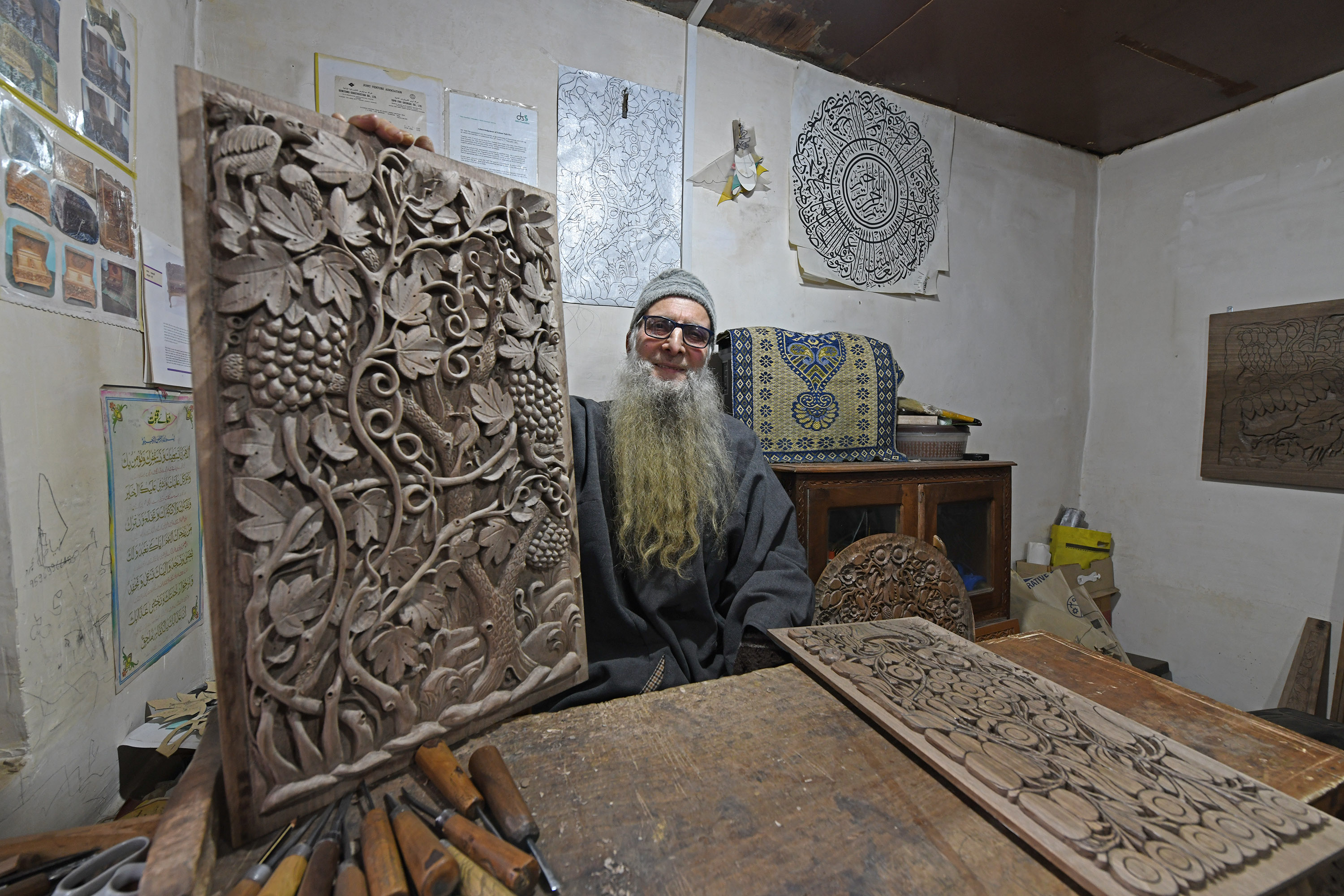
Ahmed Ali Fayyaz/Jammu
Ghulam Nabi Dar, the 72-year-old master craftsman from Srinagar, is one among the 134 personalities on whom the President of India conferred this year’s prestigious Padma awards.
The name of this artisan who dedicated his life to carving walnut wood figured along Romalo Ram of Jammu and other 110 Padma Shri awardees.
He has already won the State Award in 1984 and the National Award a decade later.
President Shankar Dayal Sharma honoured the master craftsman, raising Dar’s morale and ambition and aiming higher.
 Ghulam Nabi Dar in his workshop
Ghulam Nabi Dar in his workshop
Dar’s 1995 entry for the National Award was a wall hanging of a typical Kashmiri Panchayat meeting. It depicted Muslim, Sikh, Hindu, and Christian members sitting in a pastoral setting behind a copper samovar and ceramic cups.
“I loved it because it portrayed the reality of religious harmony in Kashmir and also our composite culture,” Dar said.
The Republic Day, on Friday, 26 January 2024, came with the great tidying for Dar. The announcement of the Padma Shri award fulfilled his life’s ambition.
‘The local Police had carried out verifications about my antecedents some time back but we had no idea of the Padma Shri coming to me. When I was told about it, I thanked the Almighty. So did others of my family”, said Dar, a resident of Dana Mazar, Safakadal.
Dar is teaching his art to his son Abid Ahmad to preserve his legacy.
“I was hugely encouraged by the National Award in 1995. Now that I have been honoured with Padma Shri, my morale is up and I feel I can rise higher even in this age”, said the septuagenarian craftsman with a flowing white beard.
He narrated how his education was terminated in his Class 3 when the family lived in acute penury and it had no money to buy books and uniforms for Dar and his siblings.
 Ghulam Nabi Dar displaying his work
Ghulam Nabi Dar displaying his work
Srinagar’s Safakadal-Eidgah belt was—and continues to be—a hub of handicrafts which include walnut wood carving, lattice work, khatamband ceilings, wood panelling et al.
The Kashmir walnut or Juglans regia grows at an altitude of 5,500 to 7,500 ft above sea level. In Kashmir, only the 200-300 year old walnut trees are permitted for felling and commercial use. The logs are passed through a meticulous process of seasoning, sawn into planks and blocks of particular sizes, and used for making trademark furniture and paneling carved as well as plain. Fine wood carving has been endemic to Kashmir for centuries.
Downtown Srinagar is strewn with walnut wood workshops where you find craftsmen bent over the wood, chiseling, and polishing. They meticulously carve out motifs of grape bunches, chinar leaves, pears, roses, lotus, iris et al in intricate designs.
Dragon motifs and patterns taken from Kani and embroidered shawls all find their place in wooden objects with deep relief carving. A variety of articles, both decorative and utilitarian, ranging from bowls, trays, cigarette boxes, wall plaques, and table lamps to bridal trousseaus, screens, bedsteads, and larger items of furniture are carved in walnut wood.
Four main types of carving are usually practiced in Kashmir—raised, engraved, undercut, and plain.
Kashmir’s walnut carving is now protected under the geographical indication (GI) of the Agreement on Trade-Related Aspects of Intellectual Property Rights (TRIPS). It is listed at item 182 as "Kashmir Walnut Wood Carving" of the GI Act 1999 of the Government of India with registration confirmed by the Controller General of Patents Designs and Trademarks.

Ghulam Nabi Dar
In the early 1960s, Dar’s maternal uncle took him and his brother to a local wood carving artisan Abdul Razaq Wangnoo to earn the family’s bread and butter.
"For the initial five years, we operated manual hole-driving machines. I was paid 10 annas a day and my brother 6 annas. Our wages became a total of one Rupee with which we had to sustain a family of 13 members—5 sisters, 6 brothers, and parents. For many days a month, we had nothing to eat, no rice, no bread. We would walk bare-footed from our home to the workshop”, Dar recollected with tears trickling down his beard.
Dar’s wages were raised to Rs 2.50 a day and that of his brother’s to Rs 1.50 when the poor duo shifted to the workshop of Abdul Aziz Bhat in their neighbourhood. It manufactured artifacts for the famous Subla & Company of Nawab Bazar. After a great deal of labour and struggle, Bhat admitted Dar to learning of the real walnut carving.
“200 to 300 European customers used to visit Subla & Co to purchase the top quality walnut carving items every day. After my day’s labour, I used to roam about the public parks and gardens in Srinagar to draw sketches of trees, plants, flowers, and birds and practice the same on my boards beyond till 2:00 am. My mother used to warn me against losing my eyesight. But I didn’t relent as I had an immense passion to excel in this art”, Dar narrated.
Finally, Dar approached a renowned but immobilised master of the wood carving art, Nooruddin Tikoo at Narwara, in downtown Srinagar. Paralyzed on the right side, Nooruddin used to eke out his livelihood by drawing designs for artisans with his left hand.
“I worked on his drawings and this enhanced my imagination and carving skills and then there was no looking back,” Dar said, fondly recalling his master and sending prayers for him. “I used to copy the designs of flowers, animals, birds, and other designs on paper. At home, I used to design on mud-plastered walls and doors only to invoke the ire of my mother”.
With a practice of over 60 years, Dar carves different designs every time he makes a new piece. He has a repository of designed dining tables, beds, tables, wooden jewellery boxes, wall hangings, wooden furniture, and sofas. In 1995, he won the National Award for a wooden box with flowers engraved on it, which had four human faces on the corners depicting various emotional states in one’s life.
ALSO READ: Kirti Chakra amplifies heroism of Havildar Majid Hussain in Poonch
Rising to unparalleled fame, virtually an illiterate Dar was invited for demonstration and work by several foreign countries. He worked on his products in Iraq, Thailand, Spain, Indonesia and Germany. “By the grace of Almighty, I have reached the zenith of this trade and art. God has bestowed me with everything. But I will continue to remember the days when my family had nothing but potatoes to eat”, Dar added.
